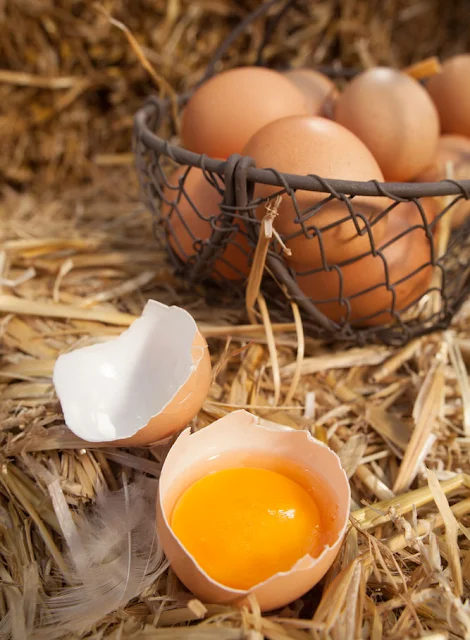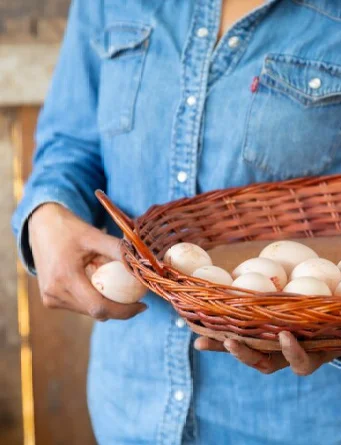How Often Should You Collect Eggs from your Chicken Coop?
You've successfully raised your flock from baby chicks to laying hens. You have experienced the immense joy and sense of satisfaction from collecting your first egg.
And now you're probably wondering, how often should you collect eggs from your chicken coop?
Collecting eggs from my chicken coop is the highlight of most days!
I always leave that until last - until after I've let my girls out, said good morning to them all, given everyone a quick once-over to be sure they all look okay, filled their feed trays and given them fresh, cool water - only then do I peek into each nesting box to look for eggs.
More than 12 years since I started raising chickens again as an adult it is still so exciting and such a joy to reach into a box to pull out a warm, freshly laid egg.
When Do Chickens Lay Their Eggs?
Understanding when hens generally lay their eggs, and how often they lay is important in determining the timing of checking for eggs.
Since most of the time chickens will lay their eggs either in the early morning or mid morning, usually within 6 hours of sunrise, sometimes there are already eggs when I open up the coop, but other times the boxes are empty.
But generally by late morning-ish, nearing noon time, most of my hens are done laying for the day, so I always make sure to go check for eggs around lunch time.
But is collecting eggs from your chicken coop once a day enough? Maybe not.
How Often Should You Collect Eggs from Your Chicken Coop?
Although unwashed, fresh eggs will stay perfectly good to eat for a week or two out at "room temperature" on your kitcen counter, since the environment (and temperature) in your coop likely isn't quite as constant, eggs shouldn't be left outside overnight if you can help it.
The fluctuating temperatures between daytime and nightime outside in a chicken coop will cause the egg to age faster and not stay fresh as long, as well as deteriorate the quality.
If condensation forms on the outside of an egg, that destroys the integrity of the "bloom" which is the invisible coating on the shell that protects the inside of the egg from air and bacteria entering.
While theoretically eggs left for a couple of days in the coop, or if you find them laid outside in random places, are likely just fine to eat (pop them into a glass of water and do the "float test" if you're not sure how old they are), realistically it's best to collect them as soon as feasibly possible.
Collecting eggs from your chicken coop should absolutely be a daily chore along with everything else, but there are a couple of reasons why you really want to be collecting eggs twice, or even three times, a day.
As I mentioned earlier, since you're already in the coop letting the chickens out, checking for eggs first thing in the morning makes sense.
But you'll likely find that most of your hens haven't laid their eggs yet, so checking again around lunch time will likely reap you more eggs in your basket.
Then when you lock the coop up at night, it's a good idea to check once again - I mean, you're there, so why not do one last check. I generally check for eggs a minimum of three times a day.
Reasons to collect eggs from your chicken coop more than once a day
Collecting Eggs to Discourage Broody Hens
Leaving eggs in the nesting boxes for a prolonged period of time might encourage one or more of your hens to go broody, meaning they decide to sit on the eggs for 3 weeks in order to hatch them.
Unless you want to add chicks to your flock, you likely don't want to encourage a broody hen, so collecting eggs frequently is a good idea.
A hen usually won't start sitting on eggs full time until she has about a dozen eggs under her, but depending on how many hens you have, it won't take them long to amass that many (especially since hens all seem to like to lay their eggs in the same box!) so making sure you don't let the eggs pile up in that one nest can deter broodiness from setting in.
Collecting Eggs to Prevent Broken Eggs
Not collecting eggs regularly can also lead to broken eggs.
In addition to broody hens jockeying for position in the nest with another hen trying to lay her egg, multiple eggs in a nest are more apt to get jostled and accidentally broken as another hen hops in to lay her egg or knocked out of the nest and breaking on the coop floor
No one wants broken eggs, so checking boxes regularly can help prevent that.

Collecting Eggs to Discourage Egg Eaters
Collecting Eggs to Prevent Stolen Eggs
Collecting Eggs to Keep them Clean
Collecting Eggs In the Winter
Also, if you have a rooster, there's a good chance that your hens' eggs have been fertilized and even without a hen sitting on them, could very well start to develop in sustained temperatures near 100 degrees.
What about If you Miss a Day or Two Collecting Eggs?
So to summarize.






























